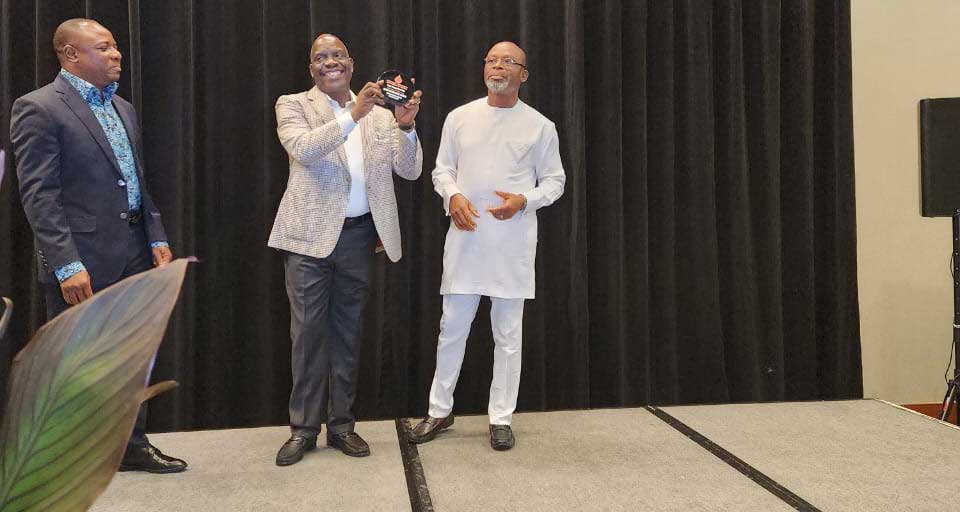NUPRC Adopts Alternative Funding Mechanism To Optimize Nigeria’s Oil & Gas Production
In a bid to optimize Nigeria’s oil and gas production as energy transition gathers momentum, the Nigerian Upstream Petroleum Regulatory Commission as a business enabler has chosen to adopt alternative funding mechanism that leverages the technical capacity of indigenous and foreign investors.
The NUPRC Chief Executive, Engr Gbenga Komolafe said this while delivering a paper at the ongoing Offshore Technology Conference holding in Houston, Texas, United States.
Advertisement
The theme of his paper is, “Energy transition and upstream oil and gas landscape: The journey, challenges and way forward.”
Komolafe said the need to adopt alternative fund mechanism was based on the conviction that it would help to create robust synergy among the oil services providers , financing institutions, commodity traders and awardees to accelerate oil and gas production.
In the operationalization of this mechanism, he said the NUPRC, as a regulator and on behalf of the Federal Government would provide the confidence assurance to participants in the funding model.
This, he noted, is to ensure that all parties within the business collaboration agreement fully honour the terms of the agreement under the watch of the Regulator.
Advertisement
He expressed optimism that through the conference, investors will seize the opportunity to interact and begin to develop the required synergy for the success of the initiative.
He said, “Given the huge opportunities presented by abundant oil and gas reserves in Nigeria and against the need to optimize our oil and gas production while energy transition gathers momentum, the NUPRC as a business enabler has chosen to adopt alternative fund mechanism that leverages the technical capacity of indigenous and foreign investors to create robust synergy among the oil services providers , financing institutions commodity traders and awardees to accelerate oil and gas production while the conversation on Energy Transition continues to gather momentum.
“In the operationalization of this mechanism, the NUPRC as a regulator and on behalf of the Federal Government of Nigeria (FGN) shall provide the confidence assurance to the participants in the funding model.
“This is to ensure that all parties within the business collaboration agreement fully honour the terms of the agreement under the watch of the Regulator.”
The NUPRC Boss explained that in a bid to achieve net zero by 2069, Nigeria has chosen gas is it’s pathway to the energy transition.
Advertisement
To achieve this, he said the Government has designed a programme that ensures that gas actually plays a role to lift Nigeria out of the challenges that confront the country in order to drive industrial development.
In this direction, Komolafe said 2021 to 2030 was declared the Decade of Gas; coming on the back of 2020 which was Nigeria’s Year of Gas’.
He said, “The work done so far has aggregated the gas demand and supply views, infrastructure 10 requirements and the suitable pricing framework which will serve as the enabler for unlocking the investments for the required infrastructure that will drive the convergence of demand and supply.
“That work reveals that gas demand grew at an average of 3.3 per cent p.a. between 2010 and 2020. This was driven largely by growth in domestic demand enabled by an improvement in Domestic Supply Obligation fulfilment to 33% in 2020, compared to 22% in 2010.
“Between 2020 and 2030, demand is expected to grow at a compound annual growth rate of 16.6% p.a., driven by major projects such as the Nigeria Liquefied Natural Gas (NLNG) Train 7, in the base case scenario, and Nigeria/Morocco pipeline, NLNG Train 8 and Ajaokuta-Kaduna-Kano (AKK) pipeline, in the high case scenario.
“A comprehensive analysis shows that gas demand in Nigeria could grow to 22.5 billion cubic feet per day by 2030 compared to 4.9 billion cubic feet per day in 2020. Furthermore, domestic consumption could account for 60% of total demand by 2030 compared to 30% in 2020.”
Advertisement
In just a decade, he predicted that the demand landscape could change exponentially, especially if the power sector challenges are resolved.
However, on the supply side, Komolafe said it is projected that onshore Non-Associated Gas will account for 47% of total gas supply by 2030.
The import of this, he added, is to showcase opportunities in gas development in the Nigerian upstream sector.
Given the fact that most players within the international financial ecosystem are progressively moving away from funding fossil fuel development, he said decarbonisation story will need to be incorporated into Field Development Plans (FDPs) in order to attract funding.
Nevertheless, he said the opportunity for investment and fantastic returns remains undiminished and is continually available to prospective investor.



